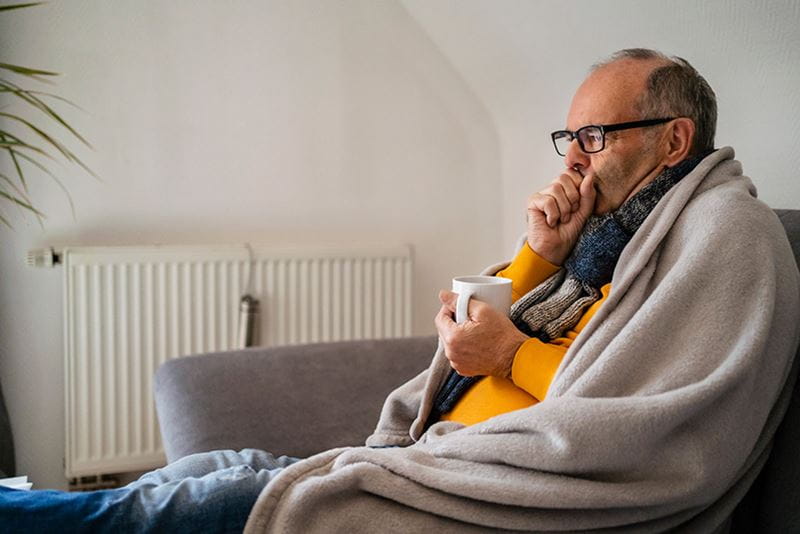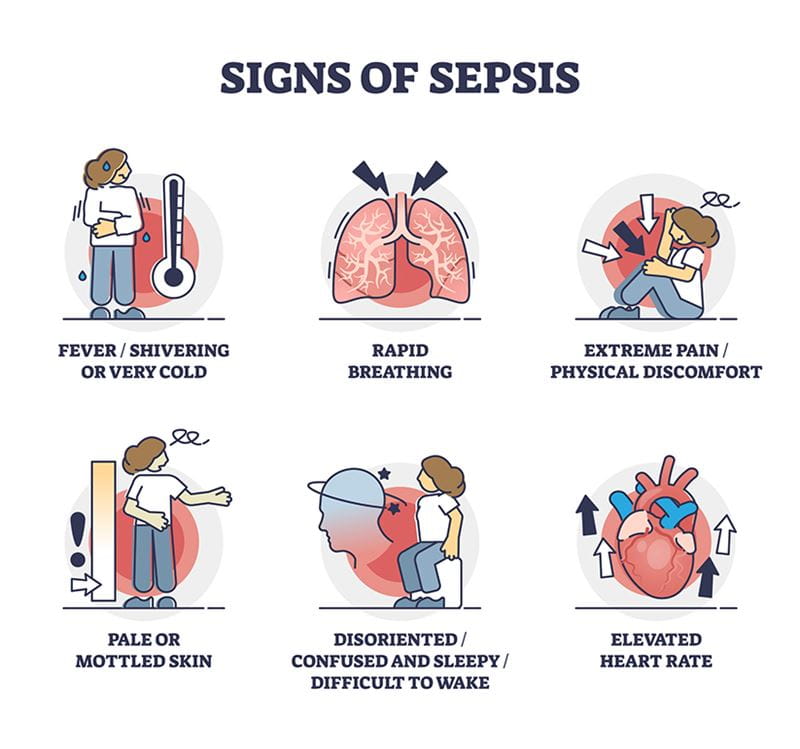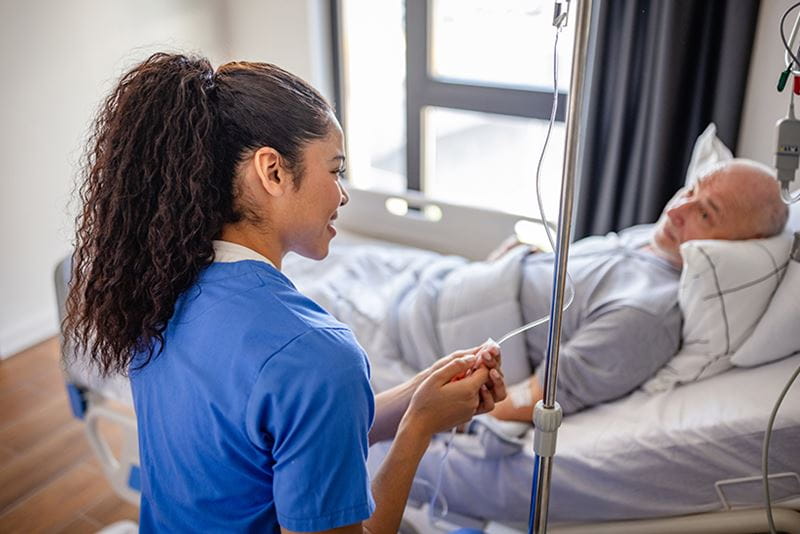Am I at risk of sepsis – and what are the signs?
Would you know the symptoms of sepsis? Our expert guide explains what you need to know and why prompt action can be lifesaving.

Would you know the symptoms of sepsis? Our expert guide explains what you need to know and why prompt action can be lifesaving.

Sepsis is a life-threatening medical condition caused by the body’s immune system going into overdrive and attacking its own tissue and organs in response to an infection. The worst-case scenario is that it can cause organ failure and death.
It was formerly known as septicaemia or blood poisoning. Around 245,000 people are estimated to be affected every year in the UK, with 48,000 deaths – five deaths an hour.
“The infection that triggers sepsis doesn’t have to be serious. Although pneumonia and urinary tract infections are the most common causes in older people, something as minor as a cut to your finger can cause it,” explains Dr Ron Daniels, an NHS consultant in critical care at University Hospitals Birmingham NHS Foundation Trust, and founder and chief medical officer of the UK Sepsis Trust charity.
“A lot of cases of sepsis follow a minor viral illness and the bacterial infection then takes opportunity to take hold. In some cases, it can start from an infected cut, bite or sting.
“The key message is that you can survive it if the infection is treated with antibiotics in time, which is why spotting the symptoms is so crucial.”

People aged 75 and over are more at risk of developing sepsis. “This is in part due to our immune system changing and becoming a little less effective, and also because older people are more likely to have underlying medical conditions that increase the risk of infection, such as diabetes or chronic obstructive pulmonary disease (COPD),” says Dr Daniels.
“Older people are more likely to have operations or indwelling (invasive) devices such as catheters, which also puts them at more risk of an infection.”
Other vulnerable groups at higher risk include people of any age with chronic underlying illnesses, including those taking immunosuppressant drugs, plus babies under one and pregnant women.
“Not directly, no," says Dr Daniels. "Cases don’t peak hugely in the winter months – you can develop it at any time of year, but sometimes there are viruses circulating in high numbers (such as Covid or flu), or bacterial outbreaks (such as Group A Strep), which indirectly can cause more cases."
“Yes, they are. This is because the population is ageing and growing, and we are doing more and more invasive procedures in older and sicker people,” explains Dr Daniels.
“There’s also the issue of antimicrobial resistance (AMR), which can make infections harder to treat – meaning people will be more likely to develop sepsis.”
The good news, however, is that awareness of the condition is also increasing.
The UK Sepsis Trust says there are six key symptoms of sepsis to look out for, with the initial letters making up the acronym SEPSIS:
If someone has any one of the symptoms above and they think they have an infection, they should go straight to A&E.

“Even if these symptoms aren’t present, people should be vigilant if they have an infection and are feeling worse than usual,” says Dr Daniels. “The first thing is for people to trust their instinct.
“People know what they normally feel like when they have an infection, or how their loved one usually behaves, so if something seems much worse than normal, or if someone is deteriorating when you might expect them to be improving, then trust that instinct and go and see your GP. Or call 111 and just ask: ‘Could it be sepsis?’”
“In most cases, people with sepsis will go downhill within a 24-to-48-hour window,” says Dr Daniels. “For example, if you cut your finger it will be red and a bit painful and annoying, and then you might deliver a fever and notice redness tracking up from your finger: if you start to feel very much worse, that’s when you should begin to worry.
“In a few cases, it will happen much more rapidly than that – people who’ve been quite well deteriorate rapidly, with symptoms developing over a couple of hours. Maybe their hands and feet have become cold or they've become very confused. If that happens then that is a true medical emergency; you need to drop everything and go to A&E or call 999 for an ambulance.
“If someone is relatively well in the afternoon but becomes very confused and can’t get up by the evening, it is a true medical emergency. For most people, it tends to develop a little more slowly but it’s still important they seek immediate help if they develop one or more of the six symptoms.”
This can be tricky as there is no definitive single test for sepsis, but if sepsis is suspected you should be assessed in hospital. Blood tests will be done, and your organs and other vital signs will be monitored.
There's a package of care developed by the UK Sepsis Trust called the Sepsis Six, which, if delivered within one hour of a patient being recognised as having sepsis, can almost double their chance of survival.

The treatment package includes:
Antibiotics and control of the source of infection are the mainstays of treatments of treating sepsis caused by bacterial infections.
“In terms of antibiotics, there isn’t just one drug we rely on; it will depend on where we think the infection is coming from,” says Dr Daniels.
“If the source of the infection hasn’t been identified, broad spectrum antibiotics that act against a number of types of bacteria will be started.”
Antibiotics don’t treat viral or fungal infections. Fungal infections can be treated with anti-fungal treatments; anti-viral treatments are less effective against viral infections, though.
Around 40% of sepsis survivors are estimated to suffer from physical, cognitive and /or psychological after-effects.
“Recovery from sepsis can be slow, taking several months (from 12 to 18 months in some cases). It isn’t something you always get over quickly, especially if you've been in intensive care, have significant organ damage, or are frail,” says Dr Daniels.
If you’ve been affected by sepsis, you can get help and advice from the UK Sepsis Trust nurse-led helpline on 0808 800 0029. It's open from 9am to 4pm, Monday to Friday.
Vaccinations against infections such as flu, and the pneumococcal vaccine (where these are offered), will lower your risk of becoming seriously ill with an infection, which will in turn reduce your chances of developing sepsis.
Test your knowledge of sepsis symptoms at The UK Sepsis Trust.
Jo Waters is an award-winning health and medical journalist who writes for national newspapers, consumer magazines and medical websites.
She is the author of four health books, including What's Up with Your Gut? and is a former chair of the Guild of Health Writers.


Get 3 months free, plus a £125 Totally Rewards Wellness Gift Card when you start a new policy by the end of 19 February 2026. T&Cs apply.
Underwritten by Bupa Insurance Limited.

Your chance to win a 14-day tour around the Rockies and Vancouver for two, worth more than £8,800.
T&C’s apply.

Are you retiring at the wrong age? The best age to retire for your body, brain, happiness and pocket.


Everything you need to know about the lung infection, and how you could be ill with “walking” pneumonia without realising it.

Strong calves for a strong mind: how they support our circulation and brain health, with easy moves to strengthen yours at home.


Our GP Dr Mark Porter explains what can cause itchy skin, which is a common problem as we get older.

Worried you’ve morphed into Victor Meldrew? Find out how to battle that bad mood, and what to do if you’re stuck with a grouchy loved one.

The benefits of heat and cold therapy, and how Nordic bathing won over our nervous writer.

Here’s how to spot the symptoms of heat disease and reduce your danger.


The NHS winter vaccination campaign kicks off next week. Here’s the lowdown on what you need to book.

Pilates for back pain – what to do if you are suffering, and five gentle exercises that could help.

Dizziness or vertigo: a sensation of spinning, can stop us doing everyday things for fear of falling. Try these tips to stop feeling dizzy


You don’t have to put up with bladder leaks. We try out the latest pelvic floor gadgets for men and women.

Cataracts are a normal part of ageing. Learn how to spot the signs – and when it’s time to consider surgery.